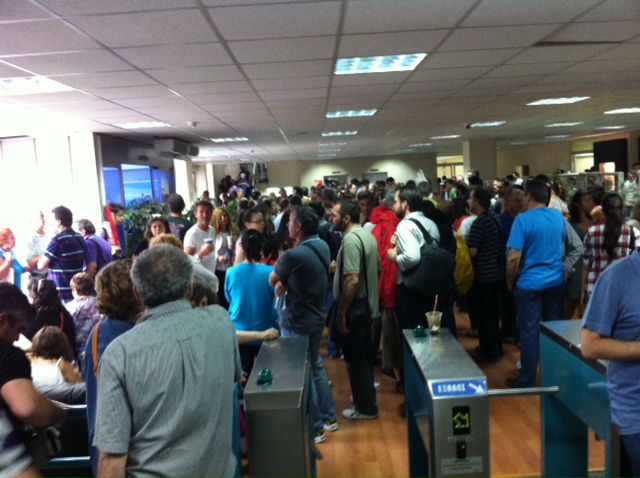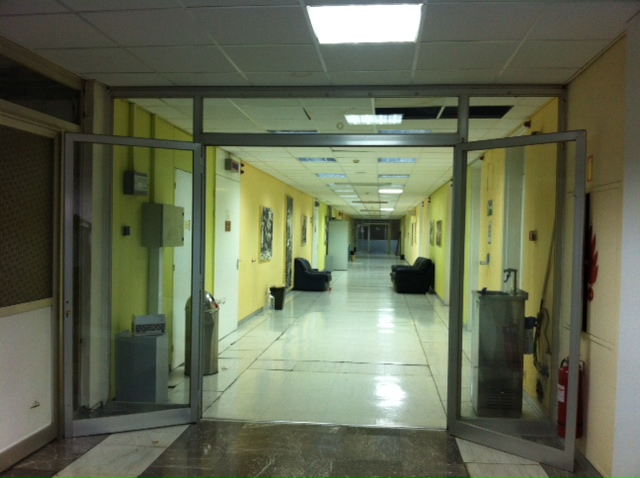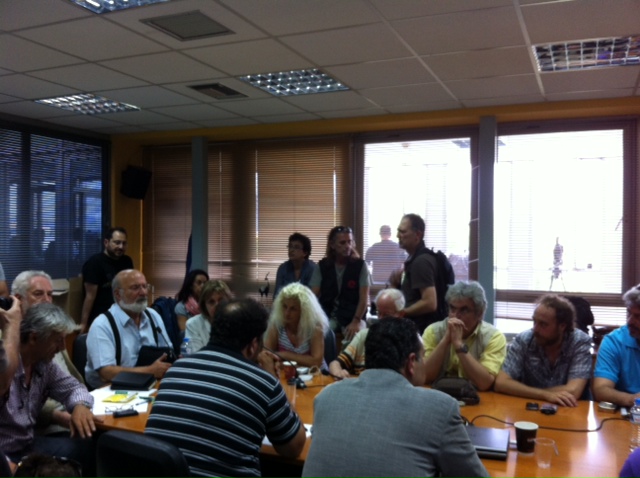Anastasia Balezdrova
Employees as well as ordinary and politically engaged citizens had gathered for the second consecutive day in the courtyard of the building of ERT. With red flags, flags of SYRIZA and of the Communist PAME in hand, they were expressing their dissatisfaction with the government's decision to close the state media.
After the long night of protests, the protesters began to slowly gather in the courtyard of the state radio and TV stations in Athens. They were not more than 2,000 in number late in the afternoon but the majority of them dispersed because of the heavy rain.
Shortly before 5 pm, different people freely passed through the gate and set off to the entrance of the building where members of the Communist PAME had gathered. Dozens of slogans in support of the employees of ERT, many of which harshly critical of the government, were hanging both on the fence and the building itself.

There were all kinds of people in the entrance hall of the television station: young and adult; a group that was sitting on the ground under the slogan "Occupy ERT", written on a sheet of paper; others who were drinking coffee or eating something and a third group of people had gathered around a piano, singing to the accompaniment of a pianist. All are united by the idea that the closure of ERT is equal to a crime against freedom of speech and access to information in Greece.
The situation up the stairs and on the upper floors was similar. The only difference between the citizens who had come to express their solidarity and the employees was a sign on their chest, reading "Supervisory staff". There were a few of them on each floor and their task was to protect the property of the media. An employee told GRReporter that the valuable film library and archive of ERT were locked and fully protected.

In response to the plan for the establishment of a new state media, the trade unionists of ERT and of journalistic unions held a press conference for foreign correspondents in Greece. Dimitris Trimis, head of the journalistic union in Athens, said that dubious motives were hiding behind the closure of ERT. "ERT is not unprofitable and it is the best payer to the insurance funds of journalists unlike bankrupt private television channels many of whose owners should have been sent to the prison in Korydallos," he said, adding that without ERT, Greek society remains without objective information because, in his words, the news in private media are a product of propaganda.
"We will continue our fight with continuous 24-hour strikes. This is not an accidental fight and it will not stop unless all the policies of the memorandum in the country are interrupted," said George Savidis, chairman of the federation of journalistic unions in Greece, adding that the two major trade unions of public and private sector workers, GSEE and ADEDY, have announced a strike in support of ERT’s employees that will be held tomorrow. "Earlier today, the police in Thessaloniki had raided the facility where the transmitters are installed and forced the employees to go out. If that happens here, in the square of Agia Paraskevi (the suburb, where ERT’s building is located – author’s note), it will become our Taksim Square," he warned.

"The government needs media that depend on it. It has decided to close ERT because it would not have obtained the support it needs in the event of elections," was the opinion of Panagiotis Kalfayiannis, chairman of the union of state radio and television workers POSPERT.
"But this policy will not be implemented. The public support for us shows that the people are against this government," he stated, adding that concerts will be organized in the courtyard of ERT in the coming days and that a group of employee representatives will present next week the developments to the European Parliament.
The press conference was attended by several members of SYRIZA and in the meantime, party leader Alexis Tsipras had left for Thessaloniki where he met with employees of ET3 television channel. The two channels of ERT, NET in Athens and ET3 in Thessaloniki, continue their live broadcasts, transmitting them via various websites and small TV channels.
"Closing ERT in this way is equivalent to the junta. This is completely unacceptable," was the opinion that could be heard everywhere inside and outside the building of ERT in Athens.
The wild debate on whether the state radio and television stations should have been closed or not continues in the social media but the winner in this duel is not yet clear. "Paradox: The junta closes its propaganda mechanism and returns the money to the people and the people want propaganda", was one of the comments in response to the rhetoric on the objectivity of the state media.
The closure of ERT is still the major issue on the political scene as well. At today's meeting, the leaders of PASOK and Democratic Left, Evangelos Venizelos and Fotis Kouvelis, have agreed to request the reorganization of the state media without closing it. Meanwhile, Prime Minister Antonis Samaras was delivering a speech in which he stood firmly behind the government's decision and said that, unlike the former one, the new state media would be completely transparent and would not waste public money indiscriminately.